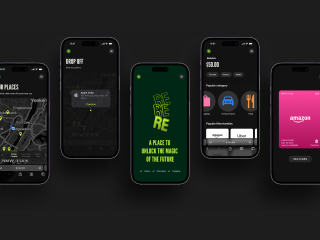RE; Advancing the Circular Economy through a Progressive Web App by fostering Sustainable Practices and E-Waste Reduction
Joann Myung
Advisor: Kari Love
RE: Advancing the Circular Economy through a Progressive Web App by fostering Sustainable Practices and E-Waste Reduction.
Abstract
My thesis explores the escalating challenges posed by rapid digital evolution and inadequate e-waste recycling practices, focusing on the disposal of cables—a significant yet often overlooked aspect of electronic waste. In response to these challenges, I have developed the "RE" app, a Progressive Web App designed for eco-conscious millennials. This app facilitates cable recycling through trading and donations, promoting responsible management of hardware consumption and aiding in the reduction of e-waste in our fast-paced digital world. The name "RE" underscores a commitment to recycling and sustainability; re-duce, re-use, recycle into practice
The web app targets a significant deficiency in the existing e-waste management systems, emphasizing the recycling of electronics—a preference that's growing among users. Insights from extensive user research highlight that despite the digital advancements, many still perceive the process of cable recycling as burdensome and untrustworthy. Cable recycling is crucial for reclaiming valuable metals and preventing environmental damage. Therefore, this app offers efficient and reliable solutions to address public skepticism and logistical challenges, facilitating a smoother recycling experience.
Moreover, recent regulatory changes, such as the transition from Lightning to USB-C cables mandated by a parliamentary ruling, highlight the need for clearer, more accessible information on sustainable practices. Urban centers, particularly New York, show a glaring lack of awareness and resources for managing cable waste sustainably. Despite technological advancements and widespread adoption of USB-C solutions, public understanding remains low, with confusion lingering about using a single charging solution for electronic devices following Parliament's approval.
My user research underscores the urgent need for platforms like the RE app, which not only facilitate sustainable practices but also educate and engage the community on the importance of robust e-waste management.

Technical Details
I have developed a mobile application using Figma, evaluated through user testing to optimize usability and effectiveness. My approach integrated UX research methodologies, including competitive analysis and heuristic evaluations, to align with market standards. I gathered both quantitative and qualitative data through interviews to deeply understand user behaviors and requirements. To encapsulate varied user viewpoints, I created personas and conducted surveys. The use of storyboards and user journey mapping helped visualize the overall user experience. The design phase involved crafting a detailed information architecture and user flow maps, followed by meticulous wireframing and prototyping to enhance interaction design.

Research/Context
My user research addresses three primary challenges in cable recycling: access, awareness, and understanding. Firstly, many people find it difficult to recycle cables due to the absence of convenient and straightforward options. They seek a simple, thought-free process for managing cable waste. Secondly, there is a significant lack of community engagement and visible action towards cable recycling, which can discourage individual participation. Lastly, the benefits and social incentives of cable recycling are not clearly communicated, preventing people from recognizing the personal and communal advantages of proper e-waste management.
The insights from my research suggest that to effectively tackle these issues, strategies must be developed to streamline cable management, enhance the recycling experience, and alleviate user concerns. This includes addressing fears about needing unused cables in the future and providing practical tips for managing cable clutter, thereby making cable recycling an accessible and engaging practice for all.